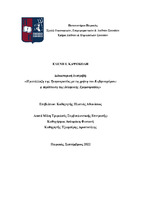Η μετάλλαξη της τρομοκρατίας με τη χρήση του κυβερνοχώρου : η περίπτωση της ισλαμικής τρομοκρατίας

Keywords
Τρομοκρατία ; Κυβερνοχώρος ; Ισλαμική τρομοκρατία ; Κυβερνοτρομοκρατία ; Al Qaeda ; ISIS ; Αντιτρομοκρατία ; Ψηφιακή Τζιχάντ ; Ευρωπαϊκή ΈνωσηAbstract
The thesis is titled "The transformative effect of cyberspace on terrorism: the case of Islamic Terrorism". It analyzes the phenomenon of cyberterrorism and whether information and communication technologies (ICT) affect terrorism. The aim is to identify the impact that these technologies - and cyberspace in general have on the operational level of terrorism. The thesis adopts a holistic approach to identify how terrorism and cyberspace interact. The theoretical framework is based on Rapoport's wave theory of «four waves of modern terrorism». The wave theory is the best fit for examining the thesis's key research question: if cyberterrorism constitutes the fifth terrorist wave. Rapoport mentions that each wave is a cycle of activities in a given period of time, which lasts about few decades, and it has specific characteristics, methods, means, actors and modus operandi. Thus, the extensive analysis of the transformative effect of cyberterrorism at the operational level is based on the above theory. The construction of a solid theoretical framework regarding cyberterrorism is very important to have a holistic approach on how terrorism and cyberspace interact. The thesis proceeds with an empirical investigation of the two case studies, Al Qaeda, and ISIS, at the operational level. It reviews the full spectrum of their activities on cyberspace based on the “Digital Jihad” model. This review helps to trace their evolution through their operational actions. These two terrorist groups were chosen because, during the last two decades, they have been the most active and innovative, as well as a source of inspiration for other terrorists. The thesis also reviews the securitization theory of cyberspace by the European Union and the emergence of the cybersecurity challenges. It proceeds with the analysis of the European Union’s strategies and policies on countering cyberterrorism. The thesis concludes that Rapoport’s theory is only partly applicable in the cases examined. In particular, in relation to the ideological backgrounds, the cases of Al Qaeda and ISIS, are placed in the Religious wave. In relation to the rest of the criteria - the use of violence or the threat of use violence in order to achieve a political goal, the international character and impact of their terrorist actions, the existence of the wave after a catalytic event (9/11 and global war on terror), the extensive use of digital technology as a mean at the operational level and the creation of a new political reality (creation of Caliphate) - it is safe to conclude that Al Qaeda and ISIS are placed in the fifth wave of terrorism.


